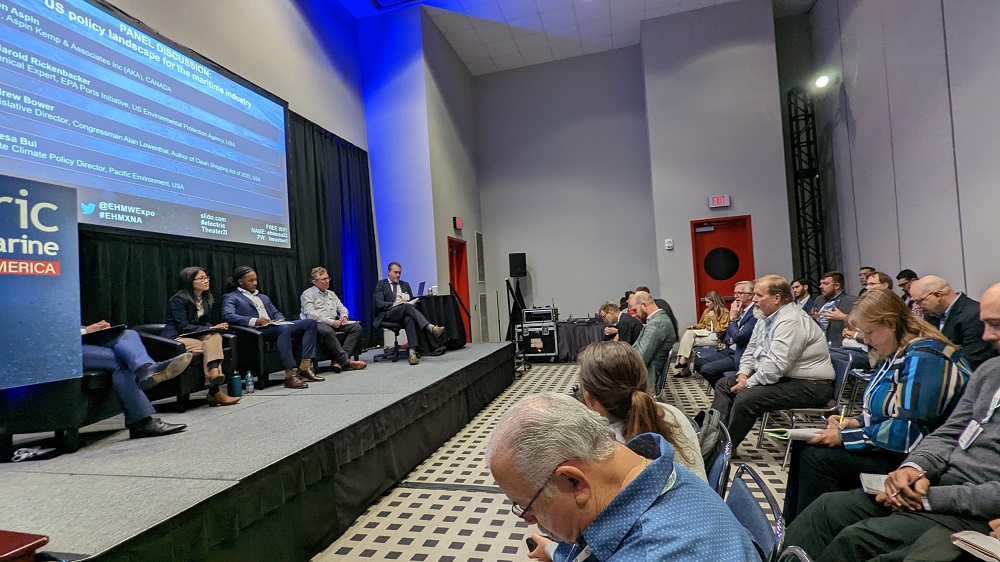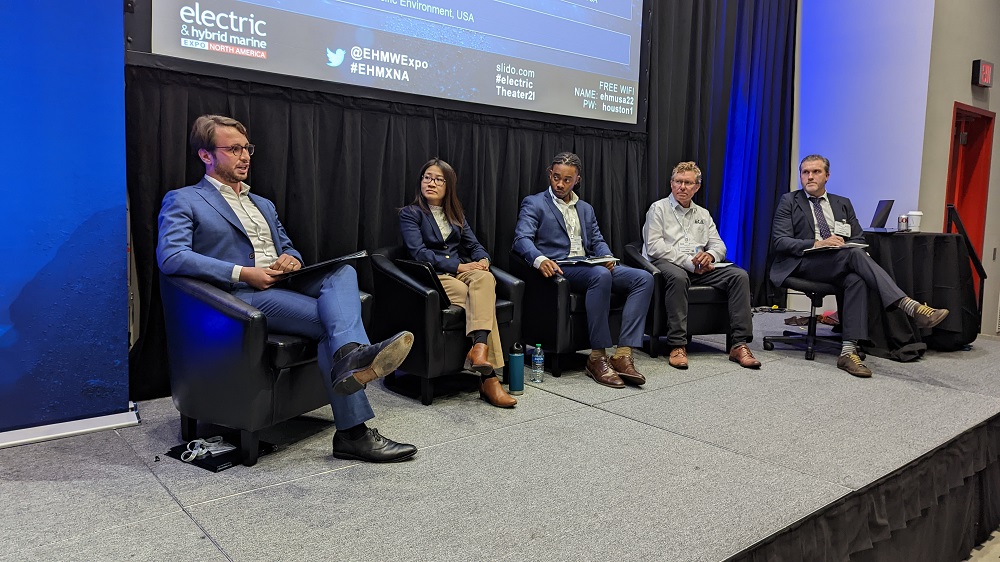New developments and innovations that will majorly impact the present and future of the entire maritime industry took center stage at the Electric & Hybrid Marine Technology Expo North America in Houston this week. But the adoption of some of these technologies can often depend on the regulatory environment.
Because of how much has been going on, there’s been a distinct effort through legislation and grant authority to drive the uptake of many new technologies. What do these efforts look like, and how do these developments impact the people developing and integrating this technology? These were some of the talking points that defined the U.S. policy landscape for the maritime industry panel discussion at the event.
Galen Hon from the PoliSea Group moderated the panel that featured Andrew Bower, Teresa Bui, Harold Rickenbacker and Jason Aspen. Each discussed their background as well as how they’re working to ensure policy goals line up with reality for stakeholders throughout the sector.
Andrew Bower is the legislative director for Congressman Alan Lowenthal, who is the author of the Clean Shipping Act of 2022. Introduced in July, the legislation is designed to zero out pollution from all ocean shipping companies that do business with the U.S. Bower talked through the opportunities that the bill is set to enable but also pointed out that it is not a comprehensive maritime bill or a green new deal. It will require a lot of work by the federal government to facilitate.
Teresa Bui is the state climate policy director for Pacific Environment. Her organization is working on every level to get ships off fossil fuel as quickly as possible. They’re also trying to push California to set emissions on ships and get some of the biggest companies in the sector (like Amazon, Walmart) to commit to zero emission shipping.
Dr. Harold Rickenbacker is a technical expert for the U.S. Environmental Protection Agency who is currently focused on the EPA Ports Initiative. The Ports Initiative supports a diesel reduction emission strategy at ports which he explained needs to consider the many needs and views from the entire port industry that are often very disparate.
“If you’ve seen one port, you’ve seen one port,” Rickenbacker said. “That’s why so much of what we’re doing is about creating connection and community between them.”
Jason Aspen is the CEO at Aspin Kemp and Associates, which is a systems integrator and engineering company that designs, manufactures, and supports power and propulsion assets for marine, offshore O&G, and land-based industries. He’s worked with a variety of clients to decarbonize their operations in small and big ways, but doing so requires an incomparable level of coordination.
One of the major talking points of the panel was around the International Maritime Organization’s (IMO) efforts to decarbonize shipping. Bui mentioned a NASA study that shows the IMO has helped to reduce the visible impact of shipping, but is still moving too slowly. There's a lot of education that needs to happen at the port level.
Introducing more requirements on ship owners is a challenge, so what does it mean to reduce or eliminate these environmental impacts without causing major disruption to the entire cargo industry? Pacific Environment believes regional collaboration is the answer, as those efforts will enable the creation of common standards that everyone can agree and adhere to.
On the topic of regulation that could define costs, Bower mentioned that we’re unlikely to see another American Clean Energy and Security Act anytime soon. Also known as the Waxman-Markey Bill, it was designed to set a limit on the total amount of greenhouse gases that can be emitted nationally.
“Something like that makes sense as policy, but it’s unpopular on multiple levels,” Bower said. “I don’t foresee that type of energy style bill being feasible anytime soon.”
That compelled a discussion around what sort of changes are feasible. Dr. Rickenbacker said that the question of how to spend the money is a question the EPA is literally asking as part of their Listening Sessions. He encouraged the audience to take part in sessions that are coming up in both November and December. That sort of interest and collaboration is something Aspin called out as being different than it has been in the past.
“It’s not as lonely anymore,” Aspin said of his company’s efforts to work with clients to reduce their environmental impact. “There is money there in a way there wasn’t before. There’s really no technical barriers. The biggest thing is getting industry to change, but also having the policy to push that change. Big corporations are setting goals themselves, which you can see with something like Shell linking executive pay to the group's climate performance.”
From there, questions from the moderator and audience focused on how the current policy landscape does or doesn’t line up with the reality that many are facing. These questions and the discussions they cultivated highlighted the balance that regulators and stakeholders must work to define to ensure that clean energy provisions that make sense for the future don’t supersede the business realities of today.





